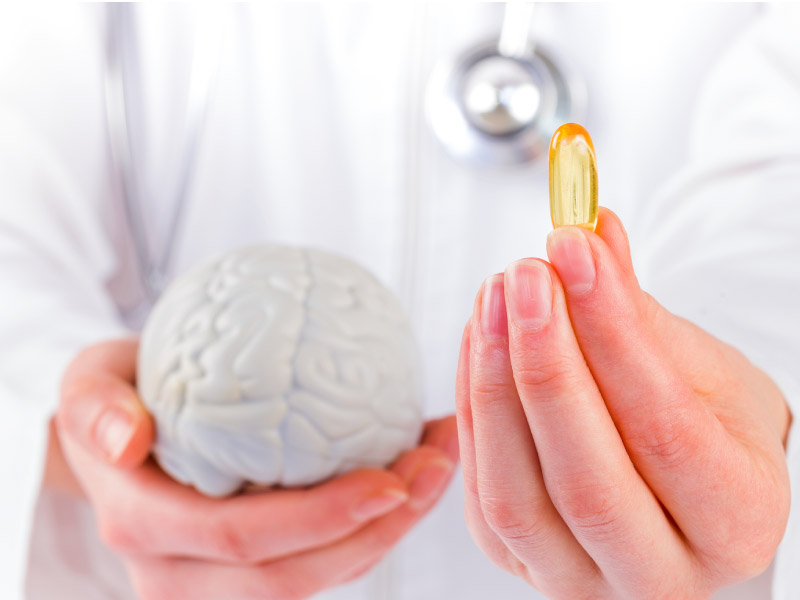What about for stroke patients? You can't do this on your own, note that these fish oils are prescription strength. Do ask your doctor how to get these benefits.
Two omega-3s in fish oil may boost brain function in people with heart disease
By Laura Williamson, American Heart Association News

Two omega-3 fatty acids found in fish oil may help improve brain function in older adults who have a type of heart disease known to put people at risk for cognitive decline.
A new study found that DHA and EPA, given in a combined supplement at prescription levels, improved cognitive function in older adults with coronary artery disease, or CAD. It is a common type of heart disease that occurs when plaque builds up in the arteries and hinders proper blood flow. Studies have shown people with CAD have a 45% increased risk for cognitive decline.
The largest improvements in brain function were seen when higher levels of both types of omega-3 fatty acids were present in the bloodstream. When analyzed individually, DHA levels were a better predictor for cognitive improvement than EPA, suggesting the presence of one type of omega-3 fatty acid was more important than the other, the authors concluded.
"The study showed EPA adds additional benefit when DHA levels are already high," said study researcher Dr. Francine Welty, an associate professor of medicine at Harvard Medical School in Boston. "But EPA levels alone had no predictive ability for cognitive improvement."
The findings, a further analysis of data published in March in the American Journal of Clinical Nutrition, are being presented next Monday at the American Heart Association's virtual Scientific Sessions by Welty's colleague and lead researcher Dr. Abdulaziz Malik, a cardiology fellow at Tufts Medical Center in Boston. The findings are considered preliminary until published in a peer-reviewed journal.
The study included 291 adults with stable CAD. They averaged 63 years old, and 83% were men. None showed problems with cognition at the beginning of the study.
Half were given 3.36 grams of EPA and DHA combined, and half were not. All participants received cognitive function tests at baseline, one year after treatment began and at the end of 30 months. The tests measured verbal fluency, language and memory; visual motor coordination; and processing speed. Blood tests at the end of the study measured DHA and EPA levels.
The team hoped to show long-term, high-dose omega-3 fatty acids could prevent cognitive decline in people with CAD but were surprised to find the supplements did much more than that, Welty said.
"They actually showed an improvement in cognitive function," she said. Those were the results published in March.
In the new analysis, the team looked at changes in the levels of EPA and DHA in the blood of participants who took the supplements, to see if higher levels of each of the fatty acids predicted the cognitive improvements. While higher DHA aligned with better performance on cognitive tests, higher EPA levels did not seem to make a difference – except in people who had high levels of DHA to begin with, Welty said.
"Someone who wants to use fish oil supplements to improve cognitive function should get a prescription for a supplement that combines the two," Welty said. She cautioned against buying over-the-counter supplements, which are not regulated by the Food and Drug Administration.
The same level of omega-3 fatty acids used in the study could not be obtained just through diet, said Penny Kris-Etherton, an Evan Pugh University professor of nutritional sciences at Penn State College of Health and Human Development in University Park.
"Getting 3.36 grams per day is hard to do just eating fish," said Kris-Etherton, who was not involved in the new study.
"You'd have to eat a lot of fatty fish every single day. One serving of fatty fish, which is 3.5 ounces of salmon, for example, has about 2.2 to 2.3 grams of omega-3 fatty acids. To get 3.36 grams per day means that you'd have to eat about 1 1/2 servings of fatty fish every day. The recommendation of two fish meals per week, including fatty fish and lean seafood like shrimp, would only get you about 0.25 gram per day, and most Americans don't even eat that much."
Omega-3 fatty acids are highest in fatty fish such as salmon, sardines, mackerel, herring, lake trout and albacore tuna. The AHA recommends eating two servings of fish per week to help reduce heart disease and stroke risk. It issued a science advisory in 2019 saying prescription fish oil supplements were a safe and effective way to lower triglycerides. The same advisory warned consumers not to take unregulated supplements.
A separate AHA science advisory issued in 2017 said omega-3 fish oil supplements may slightly lower the risk of dying after heart failure or a recent heart attack, but they do not prevent heart disease. Kris-Etherton co-authored both advisories.
"What I'm excited about is we're finding interventions that benefit cognitive function as we age," she said.
Kris-Etherton would like to see a similar study in older adults without heart disease to see if the supplements would provide a similar or greater benefit to others as they age. "Stay tuned," she said. "These are very interesting findings."
Find more news from Scientific Sessions.
If you have questions or comments about this story, please email editor@heart.org.
No comments:
Post a Comment